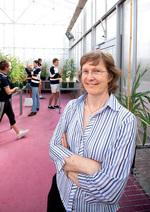Growth in agricultural sciences
Good news for the rural sector as student numbers increase. Rural Australia has played a critical part in the nation's economic success since the early days of European settlement. But its underpinning role depends on a highly skilled and motivated workforce - and that has been under threat for some years with the exodus of young people from regional centres. Now the University of Adelaide is helping to address the worrying skills shortage through a concerted profile-raising program by the School of Agriculture, Food and Wine. School leavers are being made aware of the broad range of career options in the rural sciences and an increasing number are jumping at the opportunity. The initiative is reflected in a 50 per cent increase this year in both first preference applications and offers for the Bachelor of Agricultural Sciences degree. This has translated into a significant rise in enrolments from about 40 over the past three years to 53 in 2013. "These are very good signs and it's good news for the local agriculture sector, which is crying out for skilled graduates, and great news for our rural communities," said Professor Eileen Scott, Deputy Head of the School of Agriculture, Food and Wine. Importantly, the course is attracting an equal number of rural and urban students lured by the chance of work in a dynamic and rapidly changing industry. A survey of the new students revealed that 39 per cent were from a non-farming background, 22 per cent were inspired to study agricultural science by an agriculture teacher at high school, and 61 per cent chose the subject because they are passionate about agriculture and what it can provide to society. Graduates qualify for roles across the agricultural value chain in areas such as consulting, banks, rural press, seed production, research, chemical manufacturers and re-sellers and in government agencies and local councils. And they find their skills are in extremely high demand. "Today agriculture is very different from what it was 10 years ago and it's changing all the time as farms get bigger and production methods improve," said School Head, Professor Mike Wilkinson. "Keeping a pulse on the latest developments is a key part of the University of Adelaide's approach and it's a two-way thing - we get a needs pull from industry and we feed back to industry. It's not static. "As part of this process we make sure our graduates are flexible, nimble and open-minded to deal with changes and that they have the ability to adapt for the future." A number of factors are believed to have assisted the large increase in enrolments which Professor Wilkinson said had been achieved without any lowering of the entry standards. The School has been very proactive with a strong presence at the Royal Adelaide Show and rural field days, and campus activity has increased with work experience for school students supported by visits to schools. Industry has also been attempting to address the skills shortage through initiatives such as Australian Year of the Farmer in 2012. "There is also a heightened awareness among students of the need to look at new ways of feeding the world in coming years," said Professor Scott. "Many young people are interested in being able to make a difference in global issues." This trend is also reflected in growing interest in the School's Bachelor of Food and Nutrition Science degree which has seen enrolments increase from as low as 17 in 2009 to 38 this year. The School's other Bachelor course, Viticulture and Oenology, also attracts about 30 students every year and is widely recognised as one of the best wine training degrees in the world. "The close link between wine and science has been the key to the global success of our industry, that's undisputed, and the international competition looks to our campus here at Waite," said Professor Wilkinson. "Our graduates are snapped up and can be found anywhere they make wine."
|





